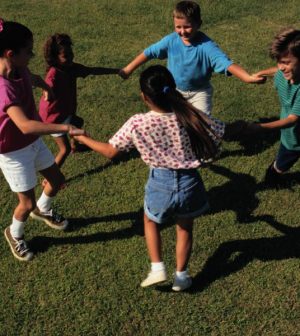- Could Your Grocery Store Meat Be Causing Recurring UTIs?
- Are You Making This Expensive Thermostat Error This Winter?
- Recognizing the Signs of Hypothyroidism
- 10 Strategies to Overcome Insomnia
- Could Artificial Sweeteners Be Aging the Brain Faster?
- Techniques for Soothing Your Nervous System
- Does the Water in Your House Smell Funny? Here’s Why
- Can a Daily Dose of Apple Cider Vinegar Actually Aid Weight Loss?
- 6 Health Beverages That Can Actually Spike Your Blood Sugar
- Treatment Options for Social Anxiety Disorder
Setting Preschoolers on an Active Path

Physical activity is closely linked to development of a child’s mental skills — ones essential to academic success and navigating challenges they’ll face throughout life.
Studies show that boosts in thinking ability, or executive function, often follow bouts of activity. But only one-third of children are physically active every day. Less than half the time they spend in school activities — like physical education, team practices and even games — includes movement that qualifies as physical activity. This shortfall means that their physical health, as well as their mental skills, may suffer.
Some problems can begin during the preschool years if youngsters don’t get the activity they need for motor skill development.
A 4- or 5-year-old needs 30 minutes of exercise every day. In addition to other benefits, this amount of exercise can also help kids who are overweight stem further fat increases. Introduce your preschoolers to fun and age-appropriate activities. Give them “active toys” like a tricycle and a ball to kick and throw, and encourage active games like tag, hide-and-seek and hopscotch.
When kids enter elementary school, help them explore various team sports, such as soccer or T-ball. As they get older, they might like the challenges of running or strength training.
Make time for exercise in your child’s schedule at every age and join in. Children who see their parents engaged in physical activity are more likely to do it and enjoy it themselves.
More information
HealthyChildren.org has more on how to encourage your child to be more active, along with other resources you can access.
Source: HealthDay
Copyright © 2026 HealthDay. All rights reserved.










